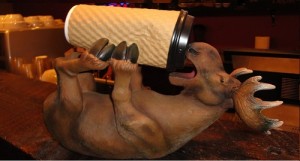
It is only a dollar or two, right? But, those dollars add up. It is the little expenses in our lives that can really get us into trouble and knock our family’s monthly budget out of whack if we are not careful. The little expenses add up over time.
We Study Large Expenses Incurred
We bend over backwards to find a great deal on a new car, when we buy a new home, or even a large purchase like a new television. But, we tend not to think about the small purchases we make.
I think that it is almost the equivalent to pigging out at a restaurant and ordering diet soda. Far too often we think that we are being good financial stewards of our money be studying the large purchases we make to death. We scrutinize those large dollar figure purchases and often postpone making them in order to find more information out. But, we may be wasting those savings on small everyday decisions that we tend not to focus on.
Compounding Expenses Incurred That Add Up
I know what you may be thinking. Who cares about one dollar here or spending two dollars over there? But, these small amounts can quickly add up. For example, let’s pick on everyone’s favorite whipping boy, gourmet coffee.
Ever since David Bach wrote about the Latte Factor in his bestselling book, The Automatic Millionaire, coffee has been the villain of every financial planner and frugality blogger who is looking to help you cut back on expenses incurred in your budget.
Don’t get me wrong. I love the book and the idea. In fact, it is one of my ten best personal finance books that should be on everyone’s book shelf. See the entire list here!
Coffee is a favorite villain because it gives you a prime example of how small expenses incurred can quickly get out of hand. If the average latte or cappuccino costs approximately $4 and you purchase one every day on your way to work, you would spend about $1,000 each year on your habit. Brewing your coffee at home costs pennies.
You may not think that $1,000 per year is an awful lot either, but what if you invested that money instead. Over the course of your working life, $1,000 invested with an 8% annual rate of return over a 40 year career compounds into $250,000 by the time you are ready to retire. Now that small cup of coffee isn’t so small an expense any more when you look at it over a long time horizon.
Little Expenses We Do Not Think About
Coffee is just the tip of the iceberg. What other small purchases do you make without really thinking about it? Are there things that you purchase every day or every week without much thought? Are you a smoker? A pack a day habit has a very similar outcome as the coffee example listed above.
Do you pound energy drinks throughout your day? I did not realize how expensive they were until I saw an entire case of them selling at my local warehouse club for almost $50.
There are so many small purchases that we make that can have a large impact on our budgets. If you are not sure where you have money leaking out of your monthly budget, then you should consider taking stock of where your small purchases are going.
What types of expenses incurred do you purchase without putting much thought into? Do you stop and buy gourmet coffee on your way to work every morning? Do you fall victim to impulse purchases at the counter?

Now that I am retired, I stay home a lot more so the chances of small expenditures each day are reduced! Even when I worked, though, I tended to buy bulk at the store and take things to work – like coke or lunch. I did used to smoke and am glad I was able to quit about 15 years ago – cigarettes are soooo expensive now what with all the taxes!
Maybe you are right…maybe one of the best things that you can do is simply not put yourself in that position in the first place.
We actually track every penny for every category. If we are getting off track at all we know right away. Good record keeping has kept us on track.
This is a great way to make sure small and large expenses do not get out of line. Most people don’t realize it’s not the small expenses that hurt you. It’s not knowing. Once you know what areas of your budget that are out of line with your goals you can adjust accordingly.
Not knowing…that’s a great point. Just like G I Joe…knowing is half the battle.
Miss T,
What do you use to track your spending? iPhone App? Good old pen and paper?
My guilty little habit is eating out at work. I feel like I need to get out of the office at lunch time for a breather, but since I live so far away, restaurants tend to be my only option. Especially in the winter time when outside is not an option.
Shaun,
I definitely understand what you mean. I live 30 minutes from my office, and I tend to eat lunch at work. I bring my lunch from home, but there are more days than not that I feel like I simply live at work because I stay there during lunch.